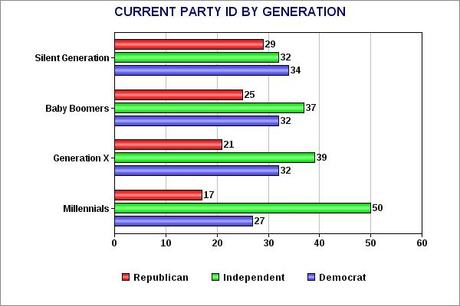
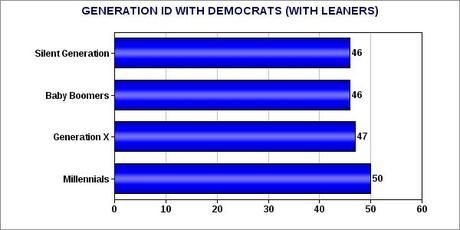
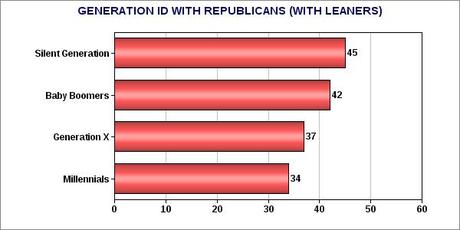 The Pew Research Center recently did a very good survey that concerned Millennials, and how they differed from other generations. It was a long article and well worth reading, but here I'll just confine myself to how the generations differed on political affiliation, ideology, and social issues. In this survey, the generations are defined as below:
The Pew Research Center recently did a very good survey that concerned Millennials, and how they differed from other generations. It was a long article and well worth reading, but here I'll just confine myself to how the generations differed on political affiliation, ideology, and social issues. In this survey, the generations are defined as below:Millennials...............18 to 33 years old
Generation X...............34 to 49 years old
Baby Boomers...............50 to 68 years old
Silent Generation...............69 to 86 years old
As you can see from the charts above, each generation is producing more Independents that the one that came before it, and currently 50% of Millennials identify themselves as Independents -- more than any other generation. But that does not mean they view the two political parties equally. The millennials give the Democrats a 10 point edge in party ID. Interestingly enough, the Republicans have damaged their reputation enough with their congressional shenanigans that now all four generations have a higher ID with Democrats than with Republicans -- Generation X by 11 points, the Baby Boomers by 7 points, and the Silent Generation by 5 points.
It gets more interesting when you add in the leaners (those calling themselves Independents but leaning toward one party or the other) as illustrated in the second and third charts. This more vividly demonstrates how each passing generation prefers Democrats more than the preceding one, and that is especially true of Millennials. When leaners are included, the Silent Generation prefers Democrats by only 1 point, the Baby Boomers by 4 points, Generation X by 10 points, and the Millennials by a whopping 16 points.
This preference for Democrats by all generations doesn't necessarily mean the 2014 election will be a great one for Democrats. As those who keep up with politics know, off-year elections like 2014 are not determined by party preference but by turn-out (since many people tend to vote in presidential elections and skip off-year elections). The 2014 election will be won by the party that does the best job of turning out voters -- and the higher the vote total, the better for Democrats.
But it should send a warning signal to Republicans for 2016 and future elections, because younger voters are trending away from them and their ideology. As the Silents (and Boomers) die off, the electorate will trend more toward the Democrats with each passing election. This trend can't be reversed unless the Republicans moderate their policies on social issues (something the teabaggers will not let them do right now). Note in the two following charts that the younger generations are getting less conservative and more liberal -- with both political ideology and on social issues.
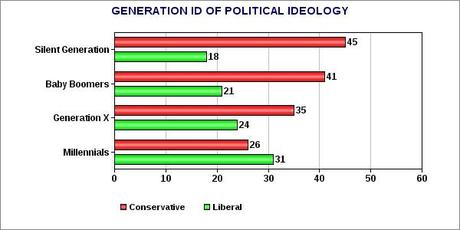
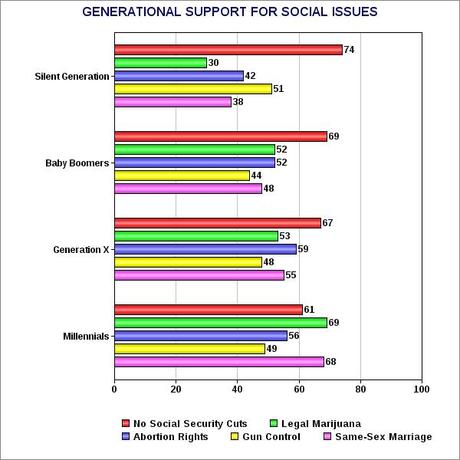 There is one more chart I thought was interesting. It shows the generational views of Congress and each party's congressional leaders. Note that while none of the generations have much respect for the current Congress, it is the Millennials that view it most favorably (but by only 30% -- not a figure to be especially proud of). But while they are all upset with Congress, note that all of the generations are more upset with the Republican congressional leaders than the Democratic leaders -- which also shows that a high turnout in 2014 would favor the Democratic Party.
There is one more chart I thought was interesting. It shows the generational views of Congress and each party's congressional leaders. Note that while none of the generations have much respect for the current Congress, it is the Millennials that view it most favorably (but by only 30% -- not a figure to be especially proud of). But while they are all upset with Congress, note that all of the generations are more upset with the Republican congressional leaders than the Democratic leaders -- which also shows that a high turnout in 2014 would favor the Democratic Party.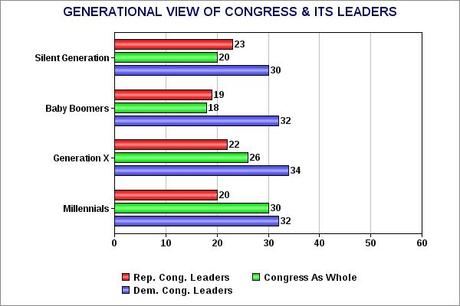 This Pew Research Center survey was done between February 12th and 26th of a national sample of 3,338 adults (with a 2 point margin of error. The generational breakdown was:
This Pew Research Center survey was done between February 12th and 26th of a national sample of 3,338 adults (with a 2 point margin of error. The generational breakdown was:Millennials..........645 respondents (4.5 point margin of error)
Generation X..........699 respondents (4.3 point margin of error)
Baby Boomers..........1,292 respondents (3.1 point margin of error)
Silent Generation..........584 respondents (4.7 point margin of error)

